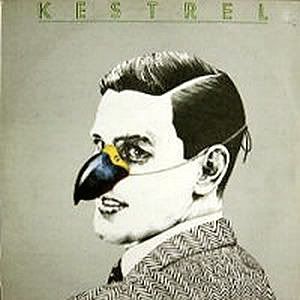
Kestrel - Kestrel - 1975 - Cube (This album is a Japanese 20-bit K2 remastered reissue of original album from 2000)
Obscure prog rock album from the mid Seventies.Excellent songs and musicianship.This group could have gone far, but like so many excellent bands in the Seventies, they disappeared overnight.There were so many talented artists back then, it was virtually impossible to compete with the mega groups.This is a classic album that never got the recognition it deserved.
TRACKS
1. The Acrobat (6:45)
2. Wind Cloud (4:41)
3. I Believe In You (4:10)
4. Last Request (4:50)
5. In The War (7:32)
6. Take It Away (4:11)
7. Ene Of The Affair (4:51)
8. August Carol (7:18)
LINE-UP
- Dave Black / guitar, vocals
- John Cook / guitar, synthesizers
- Tom Knowles / lead vocals
- Fenwick Moir / bass
- Dave Whitaker / drums, percussion
REVIEWS
Kestrel released their album of smooth, polished and song-based mid-70's symphonic progressive rock in 1975, and then vanished completely. Not an unknown fate for many bands from the same period, but it was perhaps a bit odder with Kestrel than other groups, as their highly professional and accessible music still should have had great commercial appeal in 1975. All the songs on "Kestrel" were written by guitarist Dave Black, with the exception of "End of the Affair" that was penned by keyboardist John Cook. The songs can be, to be honest, a bit hard to distinguish from each other at first, but repeated listens will quickly solve that problem. "The Acrobat" is one of the strongest tracks, and also very representative for Kestrel's style. Cook provides a backdrop of string-synths, organ and Mellotron underneath the bright and uplifting vocal melodies of Tom Knowles. Cook also adds clavinet and el-piano to the instrumental passage, making sure to give the arrangements the needed degree of variety. "Wind Cloud" is a lush ballad, but "I Believe In You" goes back to the style of "The Acrobat" again. Already here it becomes apparent that the band's sound was extremely defined, and it would have been interesting to see how they would have developed it if they had stayed around long enough for another record. "Last Request" strays away from the formula a bit by having a laid-back, piano-dominated verse with a more powerful and dramatic bridge leading up to the chorus that again is unmistakeable Kestrel. They successfully attempt some slightly more complex structures in "In the War" that is far darker than the rest of the album. "Take it Away" takes the band back on "safe" ground again, although it's probably the weakest song. Cook delivers his only song on the album with "End of the Affair", a good progressive ballad with some nice melodies. The first part of "August Carol" is yet another ultra-typical Kestrel-sounding song, but climaxes into a majestic Mellotron-theme to die for, and brings a superb finale to this forgotten minor classic. © 1998-2007 vintageprog.com
The development of electronic keyboard instruments has been much like the fashion industry; it really is a shame that these two worlds can't be brought together, in which case Mellotron trousers and a Fender Rhodes sports shirt, both back in fashion, would be a perfect match. In the early '70s, the former keyboard was just about everywhere on the hit parade, supposedly on the verge of replacing entire symphony orchestras with the touch of a finger. Kestrel was a quintet from Newcastle, England that featured a keyboardist named John Cook on Mellotron, among other axes. He was not the only talent in the group, nor the only reason to listen to the only album the group ever made, originally released in the mid- '70s on the Cube label. But largely forgotten like many a progressive rock album from this era that enjoyed only piddling success, the Kestrel effort has become the subject of cult interest basically because there's a Mellotron on it. In 2000, a Japanese collector's label reissued the album on CD. In a somewhat superficial judgment of Mellotron playing from this period, Cook seems to suffer from the same problems everyone else did. The Mello-nauts were too busy listening to themselves, apparently soaking up the wonder of so much sound coming out of every touch. While it wasn't exactly a string section, it was pretty cool, maybe too cool. The instrument seems to run from subtlety, overemphasizing the inevitable piddling melodic content. If the comparison can be switched from fashion to cooking, the result would be a goulash in which somebody has poured an entire beaker of paprika. Still, the Mellotron does not fail to liven up some of the Kestrel tracks. The finale entitled "August Carol" has shown up on several lists of "greatest Mellotron performances ever," faithfully compiled by enthusiasts. The group also features an excellent singer, Tom Knowles, and a journeyman rocker named Dave Black who plays guitar and writes songs. He was a member of David Bowie's band for a few years and went on to form several other groups such as Goldie and 747. Black wrote all but one of the songs on Kestrel, none of the material being particularly original or absorbing. The overall sound is going to be what listeners will find either appealing or not, but either way there is no denying that as far as '70s progressive rock goes, Kestrel was the real thing. © Eugene Chadbourne, All Music Guide





2 comments:
dead link, will you please re-post, thanks
Hi, bullfrog. Try
http://avaxhome.
ws/music/
kesretlkesretl.html
Thanks to L@ter
Post a Comment